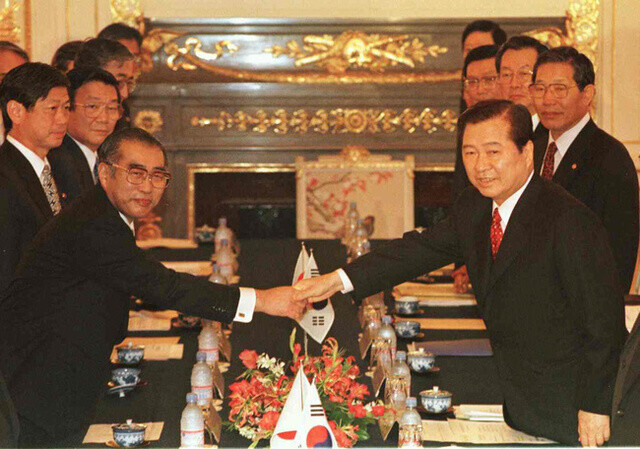hankyoreh
Links to other country sites 다른 나라 사이트 링크
[Correspondent’s column] Has Yoon even read the Korea-Japan joint declaration of 1998?


By Kim So-youn, Tokyo correspondent
On Jan. 12, the South Korean government plans to hold a public debate about the question of compensating Koreans drafted for forced labor during the Japanese colonial period, the biggest outstanding issue in Korea-Japan relations. The debate is expected to be the final step toward coming up with a solution.
A leading proposal has already been unveiled. Under that proposal, the Foundation for Victims of Forced Mobilization by Imperial Japan would start accepting donations from Korean companies and then disbursing compensation to the victims on behalf of Japanese companies. One of the companies mentioned as a potential donor is POSCO, the steelmaker that received funds from Japan as part of the 1965 agreement that settled claims between Japan and Korea.
That would ignore the wishes of victims who would prefer to receive compensation directly from Japanese companies after finally prevailing at the Supreme Court following a legal battle that went on for more than 15 years. This approach would involve the concurrent assumption of debt, in which a third party discharges a debt through an agreement with the debtor without the consent of the creditor.
Korean President Yoon Suk-yeol was right to make an aggressive effort to break through the impasse in Korea-Japan relations. Hardly anyone expected that a solution would be reached given the Japanese government’s extreme intransigence on the forced labor issue.
The negotiations weren’t easy, but there were a few goals on which Korean society should not have compromised: securing an apology from Japan, compensation from the offending companies in Japan, and consent from the victims. None of those goals would be achieved by the leading proposal, which has prompted vigorous opposition from the victims.
Why is the Korean government pushing so hard to defang the ruling by its own Supreme Court? Some think it’s because of the importance of security cooperation with Japan amid the intensifying conflict between the US and China and the growing threat of North Korea’s nuclear weapon and missile programs.
But when it comes to bilateral security cooperation, Japan is just as desperate for help from Korea as it faces twin threats in the Taiwan Strait and the Korean Peninsula. That means there’s no reason for Korea to make unilateral concessions.
Some of my confusion was cleared up when I heard Yoon’s comments about Korea-Japan relations during a New Year’s interview he gave to a certain media outlet.
“While Japan continues to take a firm line, I think that once we’ve resolved the issue of forced labor, and the liquidation of Japanese companies’ assets in particular, we should be able to arrange reciprocal visits for me and the Japanese leader that will pave the way for normalizing bilateral relations in a variety of areas,” Yoon said.
I couldn’t erase the impression that Yoon regards the forced labor issue as little more than a roadblock for Korea-Japan relations.
While he was running for president, Yoon emphasized the joint declaration made by then Korean President Kim Dae-jung and then Japanese Prime Minister Keizo Obuchi and pledged to “uphold and develop” that declaration. He repeated those sentiments during a celebratory address on Korea’s Liberation Day, which falls on Aug. 15.
Kim (1924-2009) and Obuchi (1937-2000) pledged “a new Japan-Korea partnership towards the 21st century” when they made the declaration in Tokyo on Oct. 8, 1998. The declaration consisted of 11 sections, including the principle of cooperation in five areas. In the second section of the declaration, Obuchi voiced his “deep remorse and heartfelt apology” for Japan’s “colonial rule.”
Years later, Kim recalled the joint declaration in his autobiography. “The declaration contained many principles and specific action plans. The most important of those was the Japanese prime minister’s apology to Korea. I advised Japan to look to the future instead of preoccupying itself with the past. That’s only possible when we candidly face up to the past.”
In the declaration, Kim and Obuchi made the bold decision to “squarely face the past” and “build a future-oriented relationship.” That’s the core spirit of their joint declaration.
Looking at Yoon’s approach to the issue of forced labor, I find myself wondering whether he’s even read the joint declaration. He really ought to give it a look.
Please direct questions or comments to [english@hani.co.kr]

Editorial・opinion
![[Column] Season 2 of special prosecutor probe may be coming to Korea soon [Column] Season 2 of special prosecutor probe may be coming to Korea soon](https://flexible.img.hani.co.kr/flexible/normal/500/300/imgdb/original/2024/0426/3317141030699447.jpg) [Column] Season 2 of special prosecutor probe may be coming to Korea soon
[Column] Season 2 of special prosecutor probe may be coming to Korea soon![[Column] Park Geun-hye déjà vu in Yoon Suk-yeol [Column] Park Geun-hye déjà vu in Yoon Suk-yeol](https://flexible.img.hani.co.kr/flexible/normal/500/300/imgdb/original/2024/0424/651713945113788.jpg) [Column] Park Geun-hye déjà vu in Yoon Suk-yeol
[Column] Park Geun-hye déjà vu in Yoon Suk-yeol- [Editorial] New weight of N. Korea’s nuclear threats makes dialogue all the more urgent
- [Guest essay] The real reason Korea’s new right wants to dub Rhee a founding father
- [Column] ‘Choson’: Is it time we start referring to N. Korea in its own terms?
- [Editorial] Japan’s rewriting of history with Korea has gone too far
- [Column] The president’s questionable capacity for dialogue
- [Column] Are chaebol firms just pizza pies for families to divvy up as they please?
- [Column] Has Korea, too, crossed the Rubicon on China?
- [Correspondent’s column] In Japan’s alliance with US, echoes of its past alliances with UK
Most viewed articles
- 1[Column] Season 2 of special prosecutor probe may be coming to Korea soon
- 2No good, very bad game for Korea puts it out of Olympics for first time since 1988
- 3‘We must say no’: Seoul defense chief on Korean, USFK involvement in hypothetical Taiwan crisis
- 4Korea’s 1.3% growth in Q1 signals ‘textbook’ return to growth, says government
- 5Division commander ordered troops to enter raging flood waters before Marine died, survivor says
- 6Is N. Korea threatening to test nukes in response to possible new US-led sanctions body?
- 7Is Japan about to snatch control of Line messenger from Korea’s Naver?
- 8[Editorial] In the year since the Sewol, our national community has drowned
- 9[Editorial] 10 years on, lessons of Sewol tragedy must never be forgotten
- 10[Editorial] New weight of N. Korea’s nuclear threats makes dialogue all the more urgent